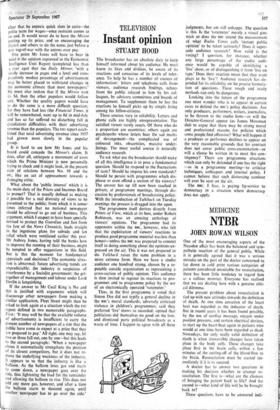Instant opinion
TELEVISION STUART HOOD
The broadcaster has an absolute duty to keep himself informed about his audience. He must know its likes add dislikes, be aware of its reactions and conscious of its levels of toler- ance. To help he has a number of sources of information : letters and telephone calls from viewers, audience- research findings, echoes from the public relayed to him by his col- leagues, by advisory committees and boards of management. To supplement them he has the reactions he himself picks up by simply living among his fellow-citizens.
These sources vary in reliability. Letters and phone calls are highly unrepresentative. The satisfied viewer rarely reacts. Of those who do a proportion are eccentrics; others again are psychopaths whose letters bear the sad marks of derangement—the complicated use of coloured inks, obscenities, massive under- linings. The most useful source is .naturally audience research.
To ask what use the broadcaster should make of all this intelligence is to pose a fundamental question. Should he respond to the fluctuations of taste? Should he impose his own standards? Should he persist with programmes which dis- please or even offend a section of the viewers? The answer has up till now been reached in private, at programme meetings, through dis- cussion by professionals of broadcasting policy. With the introduction of Talkback on Tuesday evenings the process is dragged into the open.
The programme itself derives directly from Points of View, which at its best, under Robert Robinson, was an amusing anthology of viewers' opinions. The programme had its opponents within the BBC, however, who felt that the exploitation of viewers' reactions to produce good programme material was less than honest—unless the Bac was prepared to commit 'itself to doing something about the opinions-tx- pressed on the air. This it was not prepared to do. Talkback raises the same problem in "a more extreme form. Here we have a studio audience one hundred strong, chosen by a re- putable outside organisation as representing a cross-section of public opinion. This audience is then invited to register its reactions to pro- grammes and to programme policy by the use of an electronically operated `votemeter?
Thus, in the first programme it voted that Simon Dee did not typify a general decline in the BBC's moral standards; adversely criticised .violence in children's programmes; said they preferred 'live' shows to recorded; opined that politicians did themselves no good on the box; and dismissed party political broadcasts as a waste of time. I happen to agree with all these
judgments, but am still unhappy. The question is this. Is the 'votemeter' merely a visual gim-
mick or does the BBC intend the measurement
of what Radio Times calls 'instant public opinion' to be taken seriously? Does it super- sede audience research? How valid is the voting? I question, for instance, whether any large percentage of the studio audi- ence would be capable of identifying a 'live' show, or of distinguishing it from 'live on tape.' Does their reaction mean that they want plays to be 'live'? Audience research has de- pended for its reliability on the precise formula- tion of questions. These rough and ready methods can only be dangerous.
Looking into the future of the programme one must wonder who is to appear in certain cases to defend the BBC's policy decisions. Are only producers, performers, writers, journalists, to be thrown to the studio lions—or will the Director-General appear (as James Mossman did) to argue that there may be strong moral and professional reasons for policies which some people find offensive? What will happen if a producer or performer declines to appear on the very reasonable grounds that his contract does not cover public cross-examination--or will a clause be written in to meet this con- tingency? There are programme situations which can only be defended if one has the right —as in a programme meeting—to criticise techniques, colleagues and internal policy. I cannot believe that such distressing candour will ever be seen on the air.
The BBC, I fear, is paying lip-service to democracy in a situation where democracy does not apply.






































 Previous page
Previous page